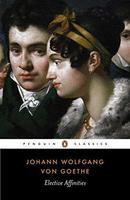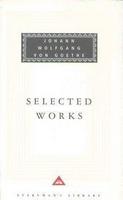Elective Affinities
Elective Affinities (German: Die Wahlverwandtschaften), also translated under the title Kindred by Choice, is the third novel by Johann Wolfgang Goethe, published in 1809. Situated around the city of Weimar, the book relates the story of Eduard and Charlotte, an aristocratic couple enjoying an idyllic but somewhat mundane life on a secluded estate; although it is the second marriage for both, their relationship deteriorates after they invite Eduard's friend Captain Otto and Charlotte's orphaned niece, Ottilie, to live with them in their mansion. The invitation to Ottilie and the Captain is described as an "experiment", as it indeed is. The house and its surrounding gardens are described as "a chemical retort in which the human elements are brought together for the reader to observe the resulting reaction." As if in a chemical reaction, each of the spouses experiences a strong new attraction, which is reciprocated: Charlotte, who represents reason, to the sensible and energetic Captain Otto; the impulsive and passionate Eduard to the adolescent and charming Ottilie. The conflict between passion and reason leads to chaos and ultimately to a tragic end. The novel, often described as Goethe's best and at the same time his most enigmatic, combines elements of Weimar Classicism, such as the plot layout as a scientific parable, with an opposing tendency towards Romanticism. The term “elective affinities” was originally a scientific term from chemistry, once widely used by scientists such as Robert Boyle, Isaac Newton and Antoine Lavoisier, at first to describe exothermic chemical reactions and later to refer to chemical reactions in which one ion would displace another. Goethe applied this understanding from physical chemistry as a metaphor for human passions supposedly being governed or regulated by such laws of chemical affinity, and examined whether the laws of chemistry somehow undermine or uphold the institution of marriage, as well as other human social relations. Voluntary renunciation also comes into play, a theme that recurs in his fourth novel, Wilhelm Meisters Wanderjahre, oder Die Entsagenden (Wilhelm Meister's Journeyman Years, or the Renunciants). Source: Wikipedia (en)
Editions
11- ISBN-13: 978-0-14-044242-7
- date of publication: 1999ISBN-13: 978-1-85715-246-3
Works based on Elective Affinities 3
Work - wd:Q951198





